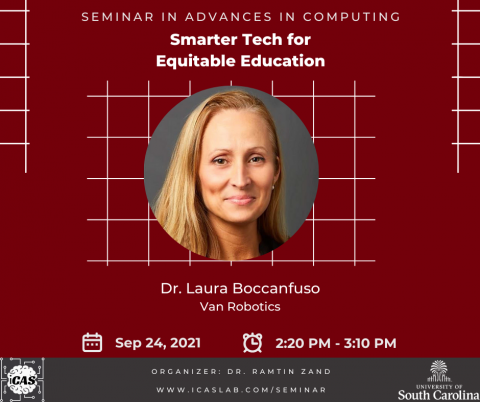- 22 views
Tomorrow, at the Seminar in Advances in Computing, we have an exciting talk by Dr. Laura Boccanfuso who is the founder and CEO of Van Robotics. The talk will be focused on AI- and robot-assisted learning for students. Dr. Boccanfuso is a UofSC alumna who received her doctoral degree under the supervision of Dr. Jason O'Kane.
Meeting Location:
Storey Innovation Center 1400
BIO: Dr. Laura Boccanfuso is founder and CEO of Van Robotics, a social robotics company headquartered in Columbia, SC that builds AI-enabled tutors. Laura received her PhD in Computer Science and Engineering from the University of South Carolina and later worked in the Yale University Social Robotics Lab and Child Study Center a Postdoctoral researcher and Associate Research Scientist. She completed the Yale Venture Creation Program in 2016, officially launched the company in 2017 and was selected for the Techstars Accelerator in Austin later that year. Laura’s work focuses on wholistic robot-assisted learning, incorporating best practices in human-robot interaction that leverage sound educational pedagogy, cognitive and learning science and machine learning techniques to accelerate learning.
TALK ABSTRACT: Existing AI-enabled applications that personalize learning for students primarily focus on assessing which skill(s) the student has mastered, which skills they have not yet mastered, and the optimal learning trajectory, or ordered series of skills building lessons, that will accelerate skills mastery for the individual. However, the process of learning effectively is not confined to a well-defined set of cognitive leaps that result in skills mastery. Instead, effective learning is very often driven by a set of personal factors that includes individual cognitive ability, mental focus, social and emotional intelligence, and intrinsic or extrinsic motivation. In this presentation, we will explore some methodologies for actively collecting and processing measures of these traits and conditions, and discuss some of the constraints that must be addressed in order to implement an effective multi-modal approach for highly personalized learning.
